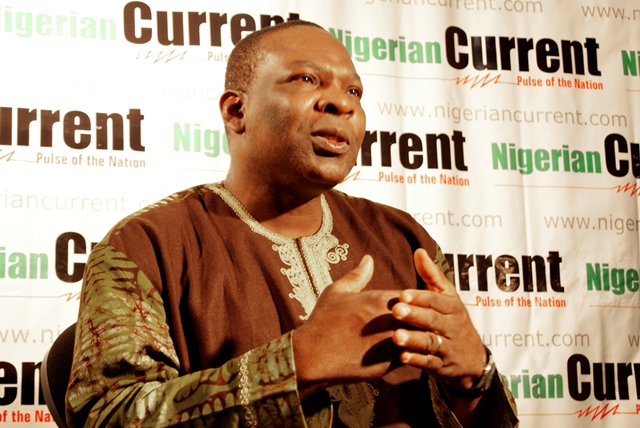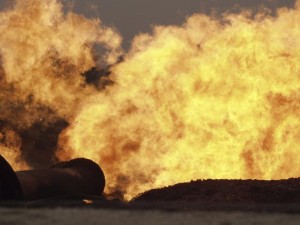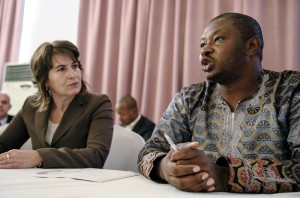Yes, Shell can be put to trial before a Dutch court for the oil pollution in Nigeria, the court ruled today, 18 december 2015. Another step in a case started in 2008. Trying to bring a multinational to justice asks for very committed campaigners. A good moment to read the conversation we had with Godwin Ojo of ERA, Friends of the Earth Nigeria. “A court case in Nigeria can take a lifetime.”

Godwin Ojo is one of the founders of Environmental Rights Action, ERA, the Nigerian sister organisation of Milieudefensie that started in 1993. Since 2013, he’s the director. In Nigeria ERA sustains a large network of village communities on whose soil oil companies operate, like the Ogoni, and operates a hotline people can call to report oil spills. ERA went to court for several cases against oil companies. The NGO is also closely involved in the court case against Shell started by Milieudefensie and four Nigerian farmers. Today, december 18 2015, the court has established that yes, Shell can be put to trial for a Dutch court for damage caused in Nigeria.
Started in 2008, the case is edging forward very, very slowly, and asking for very committed campaigners. A good moment to translate the conversation we had last year with Ojo, scientist, publicist and activist. He was in The Netherlands to talk about the (lack of) developments concerning the 2011 UNEP report of the United Nations, with recommendations about cleaning up the oil pollution in Nigeria. “A court case in Nigeria can take an entire lifetime.”
What is being done with the UNEP recommendations?
“Environmental Rights Action has put continuous pressure on getting the UNEP recommendations for cleaning up the oil pollution carried out. This year the government finally responded. Shell is in conversation with the Ogoni people. But at the same time Shell has hijacked the UNEP-process. The polluter, who has to pay for the restoration, is directing the process. They decide who is invited to meetings and who is not. They determine locations of the meetings, the logistics, the agenda. All of these things are formulated by Shell.
We reject this process, for as far as it is directed by Shell. Because however weak our ministry of environment and the NOSDRA agency for oil spills, they are the ones who should be leading this process. Or alternatively UNEP.
This is why we approached the Dutch minister Ploumen requesting to initiate a forum representing the different stakeholders. Analogous to the agreement made in Bangladesh concerning safety of textile factories. This way, we can put diplomatic pressure on the case.
The UNEP-report is clear: the problems in the delta have escalated because Shell did not keep to its own regulations. Neither did Shell keep to Nigerian law. Why does Shell need our government to make them keep to their own rules? Why are they continuing their environmental racism? Because that is what this is, if you follow your own rules in England and The Netherlands, but not in Nigeria.”
Your organisation has started several court cases in Nigeria. What are the results?
“We started with the court cases soon after ERA was founded. Often our reason to start them was not because we thought we would win. Sometimes we would stand outside the court room again after only a couple of minutes. But we used the judicial system to increase environmental awareness in Nigeria, to bring problems into the public domain.
A highlight was the High Court ruling against Shell in 2005, confirming that gas flaring is a fundamental human rights violation. We expected that would make an end to the gas flaring. But because of weak state institutions and the political and economic power of Shell, the ruling has been ignored. The flaring continues unhindered. For as far as the prevalence seems to decrease, it’s just caused by a decline in oil production, not by measures to stop flaring. We have seen no proof whatsoever for any implementation of those measures. The oil industry can’t show which of the thousand flaring locations have been closed, and for how long. The large Utorogu gas factory, for example, still flares. If Shell is serious about stopping gas flaring, that would be the location to start. But there, too, the flaring continues undiminished. New flaring locations have even been added, like in Yenagoa.”
Nevertheless, the court cases have brought ERA a lot, says Ojo.
“There’s been an abundance of court cases against oil companies. That is our contribution to the Nigerian state. Violence can’t solve the problems. People now know you can also go to court to get justice. But this is just a partial victory. Because the oil companies are happy when court cases have become an acceptable road for the victims of oil spills. They know they can delay court cases endlessly. That is expensive and they can affort it. Poor people can’t.
An environmental court case in Nigeria can take an entire lifetime. Life expectancy here is around 50 years. Let’s assume you start a court case when you’re 30. Then you are dead before there is a definitive ruling. In the court case of Milieudefensie and Nigerian fishermen, again you can see Shell is appealing. It is their strategy to wear out the victims, until they are so frustrated they give up their rights. This is why we are so grateful for the support of Milieudefensie and other Friends of the Earth groups.
The environmental awareness in Nigeria has increased the past couple of decades. We can tell by the large amount of communities joining us. These so called ‘host-communities’, in whose environment the oil exploitation is taking place, are now standing up for their rights. They themselves are now capable of demanding a clean-up of the pollution. In the ’80s that was quite different. Then the most they would ask for was compensation, they were not used to ask for restoring the balance in local ecology, or preventative measures for the future.”
And, he adds: “People are aware of the political economy in Nigeria now, and how they are tied to the oil economy. All struggles in Nigeria, between North and South, between religions, during elections, in the end all of that is a battle to control the oil resources in Nigeria. To solve these conflicts, it’s crucial to understand this.”
Environmental Rights Action has been lobbying for years for a law to regulate the oil industry. What is the current state of affairs?
“There is a concept law now, the Petroleum Industry Bill. It ensures that the Nigerian government gets a share of the profits of oil exploitation, that there will be restoration funds, and that local communities get a fair share. With this, they can start their own developmental projects. But Shell is leading a coalition of oil companies who want to prevent the Petroleum Bill from coming into force. It would make the oil industry unprofitable. They threaten to retreat from Nigeria. That Shell is getting rid of some locations is meant as a way to put pressure on our government. In the eight years this law has been in the making, oil companies are the winning team. They are part of the government and the other way around. The current minister for oil (Diezani Alison-Madueke – MV) has worked for Shell for over ten years. A classic revolving door construction.”

Shell gasfakkel in Rumuekpe in de Nigerdelta Foto: Peter Roderick
What about the oil spills – according to oil companies these are often caused by sabotage or theft?
“The investigation of the cause of the spills is hijacked by the oil companies. Amnesty International has extensively documented the irregularities (pdf) with these kinds of investigations. The oil companies take care of the invitations, the vehicles, the necessary equipment for the team that is sent to investigate a leak. They manipulate the research.
We have heard stories where a team drives into a village, sees some kids play soccer and offers five thousand naira (25 euro – MV) to whomever wants to sign a form. And those forms then say that a spill is caused by sabotage and not a technical failure.”
What is the role of the Nigerian government?
“The supervision of the investigations by the government institution that is responsible for it, NOSDRA, doesn’t count for much. It’s a weak institution. That is why we want increased capacity and means for NOSDRA and the ministry of environment, so they can do their jobs properly.
Shell’s political and economic influence on the government of Nigeria and its environmental policy is huge. Eighty percent of Nigeria’s revenue comes from oil. You can see that when you look at the offshore Bonga spill in 2011. NOSDRA has investigated this enormous spill and fined Shell for 5 billion dollars. But Shell simply refuses to pay the fine. Even after both Chambers of the Nigerian parliament backed the conclusion of NOSDRA. Shell despises the Nigerian government.”
Shell is said to consider selling a number of locations in Nigeria. Is this a good idea?
“We are not opposed to Shell divesting. But they have fouled their own nest and now they run away. Shell should clean up the mess and solve human rights conflicts before she leaves. Companies who are interested in Shell’s equipment, like the Nembe pipeline, the life line of the oil industry in the delta, should realize that they are taking over a toxic infrastructure, with decades of injustice they are liable for. That liability far exceeds the value of what Shell is offering for sale.”
ERA condemns new oil exploration, like was announced last month.
“The carbon economy, based on fossil fuels, causes climate change. The IPCC reports show that the intensity of the rising temperatures and extreme weather will increase. It’s time the world says goodbye to these fuels and embraces renewables. ERA argues for a decentralized energy model, the energy democracy. Local communities produce their own solar or wind energy. That potential in Nigeria is yet to be taken advantage of. This can change when the government shows political will, like what has happened in Germany.”
Environmental Rights Action has existed for more than twenty years now. What has changed because of ERA?
“It would be humble to say we didn’t achieve much”, says Ojo. “But we are proud of the thought that the political situation would possibly have been far worse if we hadn’t campaigned. We have succeeded in publishing about the struggle for a clean environment, to make the people of Nigeria aware, and to draw attention internationally. That is a very big success.”

Minister Ploumen en Godwin Ojo tijdens de bijeenkomst in Port Harcourt, juni 2014. Foto: Marten van Dijl
What is your advice to Lilianne Ploumen, now that you’ve asked her to mediate in the restoration of the Niger delta?
“Minister Ploumen is committed, aware of the complex situation and willing to act. We appreciate that very much. What she probably fears most, is the result. It’s one thing to start something. Getting results is another thing. Minister Ploumen seems to me to be a very result oriented person. This is why we asked her to bring diplomatic representatives together in a forum and put pressure on the execution of the UNEP recommendations. Ploumen is doing a very good job, but more is needed from her. Just go get it. Make the effort! It’s better to do something, than do nothing at all.”



[…] Shell, weil sie bei ihrer Tätigkeit in außereuropäischen Ländern mit zweierlei Maß messen. Godwin Ojoeiner der Gründer von ERA, sagte, dass die Probleme im Nigerdelta eskaliert seien, „weil Shell […]